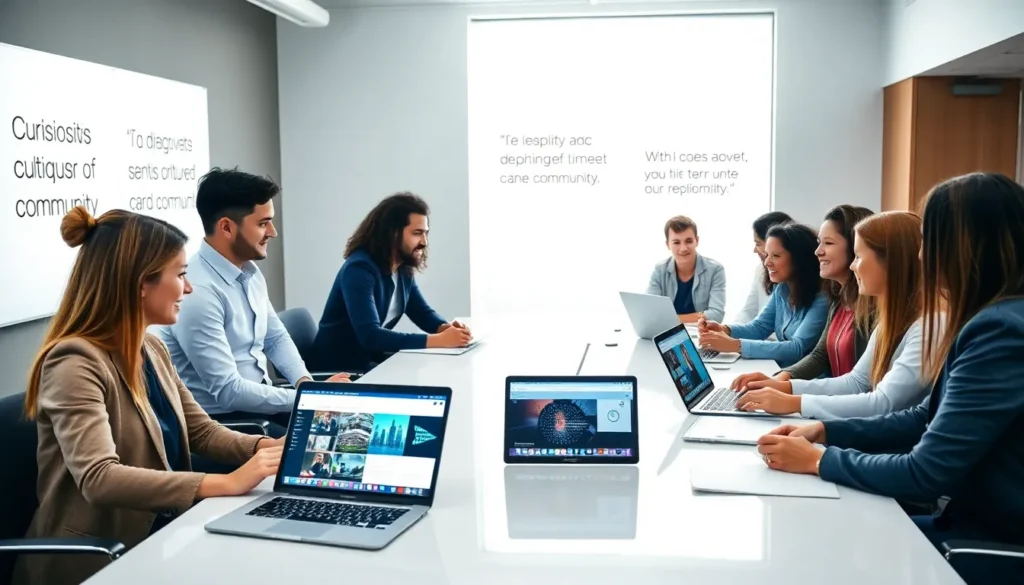In today’s fast-paced world, healthcare mobile apps are like that trusty sidekick who always knows where to find the best pizza in town. They’re not just convenient; they’re revolutionizing how people manage their health. From tracking fitness goals to scheduling doctor appointments, these apps put the power of healthcare right in your pocket.
Imagine having a personal health assistant that never takes a day off and doesn’t mind being called at 3 a.m. for a midnight snack recipe. With the right app, users can monitor vital signs, access medical records, and even consult with doctors—all while lounging in their pajamas. As technology continues to evolve, healthcare mobile apps are becoming indispensable tools for anyone looking to take charge of their well-being. So, let’s dive into the world of healthcare apps and discover how they can help users live healthier, happier lives.
Table of Contents
ToggleOverview of Healthcare Mobile Apps
Healthcare mobile apps play a crucial role in enabling users to manage their health more effectively. These applications provide various tools for tracking health metrics, accessing medical information, and connecting with healthcare professionals.
Definition and Purpose
Healthcare mobile apps refer to software applications designed specifically for medical and health purposes. They serve multiple functions, such as helping users monitor chronic conditions, facilitating telemedicine visits, or offering health-related education. The primary objective of these apps lies in enhancing patient engagement and promoting healthier lifestyles. Users benefit from receiving personalized insights and reminders that boost adherence to treatment schedules.
Types of Healthcare Mobile Apps
Numerous types of healthcare mobile apps exist, each addressing specific needs. Fitness tracking apps help users set and achieve fitness goals, including tracking workouts and calorie intake. Medication management apps enable users to schedule doses and receive reminders, ensuring they stay compliant with prescriptions. Telehealth apps connect patients directly with healthcare providers, simplifying access to consultations and medical advice. Moreover, symptom checkers allow users to input symptoms and receive possible diagnoses, guiding them on whether to seek further care.
Benefits of Healthcare Mobile Apps

Healthcare mobile apps significantly enhance health management. These applications streamline various processes, making them indispensable for users.
Improved Patient Engagement
Healthcare mobile apps boost patient engagement through interactive features and personalized content. Users access tailored reminders and notifications, encouraging adherence to treatment plans. Increased connectivity with healthcare providers fosters open communication, enabling users to seek advice and support easily. Additionally, these apps often include educational resources, promoting informed decision-making. Increased interactivity through features like quizzes and forums facilitates a deeper understanding of personal health conditions. Engaged patients tend to have better health outcomes due to their active roles in managing health.
Enhanced Access to Information
Healthcare mobile apps improve access to essential health information. Users can easily find details about medications, potential side effects, and treatment options. These platforms often host databases with reliable health content, offering easy navigation. Instant access to telemedicine options allows for prompt consultations with healthcare professionals. Furthermore, users can track personal health data, creating a comprehensive health profile. This information aids in better discussions with healthcare providers during appointments. By enhancing access to vital resources, these apps empower users to take control of their health journey.
Challenges in Developing Healthcare Mobile Apps
Healthcare mobile app development faces multiple challenges that impact functionality and user adoption. Key issues include regulatory compliance and data security, both of which demand careful attention throughout the development process.
Regulatory Compliance
Regulatory compliance remains a primary challenge in healthcare app development. Developers must adhere to regulations such as HIPAA in the United States, which protects patient information. Regulatory bodies impose strict guidelines on data handling, necessitating extensive documentation and testing. Failure to comply can result in severe penalties or app disqualification from the market. Ensuring that apps meet these compliance standards is essential for gaining user trust and securing partnership opportunities with healthcare providers.
User Privacy and Data Security
User privacy and data security present another significant hurdle. Healthcare apps handle sensitive information, making them prime targets for cyberattacks. Developers must implement robust security measures, including encryption and secure user authentication, to safeguard this data. Meeting user expectations for privacy also hinges on transparent data usage policies. If users perceive a lack of security, they may abandon the app, impacting its overall success. Balancing functionality with stringent security measures is critical for developers aiming to create trusted healthcare mobile applications.
Future Trends in Healthcare Mobile Apps
Healthcare mobile apps continue evolving, with significant trends shaping their future landscape.
Integration with Wearable Technology
Integration with wearable technology enhances the functionality of healthcare mobile apps. Wearable devices track vital signs, such as heart rate and activity levels, in real time. These apps sync data seamlessly from devices like smartwatches or fitness bands, allowing users to monitor their health metrics effortlessly. Users can set personalized health goals, receiving reminders and feedback based on their activity. This synergy fosters proactive health management, making daily tracking more engaging and informative. Developers prioritize user experience, ensuring that data presentations are clear and actionable.
The Rise of Telehealth Features
The rise of telehealth features marks a transformative trend in healthcare mobile apps. Users enjoy convenience with virtual consultations, allowing them to connect with healthcare professionals from home. Apps offer functionalities such as video calls, messaging, and prescription management, streamlining communication between patients and providers. Increased access to medical advice reduces barriers, particularly for those in remote areas. Telehealth features prioritize quick responses, ensuring users receive timely guidance. The ongoing integration of telehealth within healthcare apps promises to enhance patient satisfaction and overall health outcomes.
Healthcare mobile apps are revolutionizing the way individuals manage their health. By providing convenient access to vital resources and personalized insights, these apps empower users to take charge of their well-being. As technology continues to evolve, the integration of wearable devices and telehealth features will further enhance the user experience.
While challenges like data security and regulatory compliance remain, the benefits of these apps far outweigh the obstacles. They foster improved patient engagement and streamline communication with healthcare providers, ultimately leading to better health outcomes. Embracing healthcare mobile apps is not just a trend; it’s a crucial step toward a healthier future.









